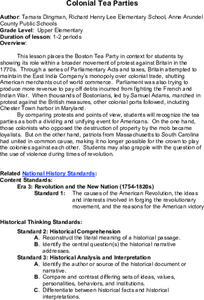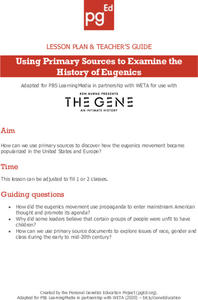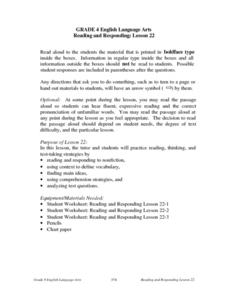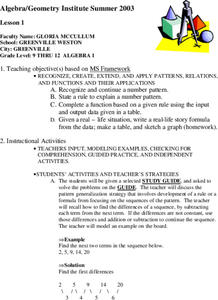National Woman's History Museum
Helen Keller--Citizen and Socialist
Do history books tell the full story of Helen Keller? The sanitized version of Helen Keller found in most textbooks leaves out her most provocative ideas. She was a socialist, fought for workers' rights, and advocated for the use of...
Center for History Education
Colonial Tea Parties
Most people know of the Boston Tea Party, but it was only one of similar protests throughout the colonies. Using a case study from Maryland, learners explore primary sources, including images and newspaper accounts of similar tea...
Center for History Education
Runaway Slaves: From the Revolution to the New Republic
Who were the enslaved people in colonial America? Using ads from enslavers looking to recapture escaped people, young historians put faces and identities to them. Primary sources, such as wanted ads, help scholars reconstruct who these...
Center for History Education
The Star-Spangled Banner: Fact or Fiction?
Is the Star-Spangled Banner an actual account of a gripping battle, or is it just a catchy tune? Young scholars compare eyewitness descriptions of the War of 1812 battle that inspired "The Star-Spangled Banner." They also examine images...
Workforce Solutions
Social Media Pit Stop
Think before you post! Employers are watching! That's the takeaway from an activity that asks learners to rate their social media posts using a scale developed by recruiters. The activity ends with scholars brainstorming ways to improve...
Newseum
Journalists Code of Ethics
Journalists are supposed to adhere to a Code of Ethics. To determine the degree to which reporters follow this code, individuals select three recent stories with photographs from newspapers, magazines, online news sites, or television...
Personal Genetics Education Project
Using Primary Sources to Examine the History of Eugenics
Eugenics philosophy takes survival of the fittest to a whole new level. With a research-focused lesson, young scientists examine the history of the eugenics movement and its impact on society. Pupils engage with a video clip, primary...
Newseum
Free Press Challenges Through History: Analyzing Historical Sources
The debate over the integrity of stories in media is not new. Young journalists analyze historical sources that reveal freedom of the press controversies and draw parallels to challenges freedom of the press faces today.
Curated OER
You Be the Critic!
Students review several pieces of art and choose one that inspires them. They research the artist and his or her contributions to art and then recreate the artwork and compare their copy to the original.
Curated OER
Springtime Flower Fun
Learners study directional skills and participate in a scavenger hunt to find flowers. They compare, group and classify the flowers by their similarities and differences.
Curated OER
What's Your Favorite Color?
Students investigate the psychology behind color choices using two sites on the Internet. They complete a worksheet and construct an Inspiration file with the data from the charts. Then they form a hypothesis and test it using the...
Curated OER
FREE STANDING STRUCTURE
Students demonstrate basic construction skills by building a free standing structure. They compute the cost of the structure.
Curated OER
Improving Literacy in the Biology Classroom via Genetic Disorders
Pupils read, write and reflect on Science articles, this approach will promote both literacy and critical thinking skills. Critical thinking skills learned in the science classroom from these activities will impact students in many ways...
Curated OER
The Cause & Effect Model
Learners analyze the plot of the story, "The Little Engine That Could" to provide a model for writing creatively, developing critical essays, producing themes, and making predictions.
Curated OER
Reading and Responding
Fourth graders read and respond to poetry. They identify the author's purpose and connect the literature to their personal experiences. Students critically analyze the poem and write a poem of their own.
Curated OER
Junior Wrters Review "The Little Prince"
Students create a piece of art reminiscent of the childhood pictures of the story's narrator, The Pilot, and engage in critical thinking using the K-W-L Chart.
Curated OER
Energy Flow in Ecosystems
Students, in groups, create a slide show about the ecosystem and answer critical thinking questions based on their research.
Curated OER
Puzzles With Partners
Students work together to complete puzzles. They practice their critical thinking skills and cooperative learning. They share their puzzles once they are complete.
Curated OER
I Dream of Castles: A Comparative Study of Castles in Feudal Europe and Japan
Students study castles of Japan while comparing and contrasting them with those of in Europe from the feudal era. They complete a unit of studies that includes reading, writing, Internet research, and critical thinking. They examine how...
Curated OER
Patterns, Relations, and Functions
Learners investigate the patterns of different data sets of numbers. They use critical thinking skills in order to find the missing numbers in any given set. This instructional activity helps to develop the skill of number sense.
Curated OER
COMING TO AMERICA: THE NEW IMMIGRANTS
Students become involved in the process of interpreting history by looking at primary source documents. This promotes critical thinking skills and comprehension of concepts and their relationships to different time periods through...
Curated OER
Using Sea Urchins as a Bioassay
Students observe how to spawn male and female pencil sea urchins. They mix together the sperm and ova from the live sea urchin to observe and record the events occurring in the control and experimental groups for fertilization. Thus,...
Curated OER
Waterworld
Students recognize poetry and the literary devices used to express the poem's meaning through poems about the sea. They use their imagination along with critical thinking skills in preparation for a creative writing assignment.
Curated OER
And the Survey Says...
Students use technology to input, retrieve, organize, manipulate, evaluate, and communicate information; apply appropriate technologies to critical thinking, creative expression, and decision-making skills. They collect and explore data...

























